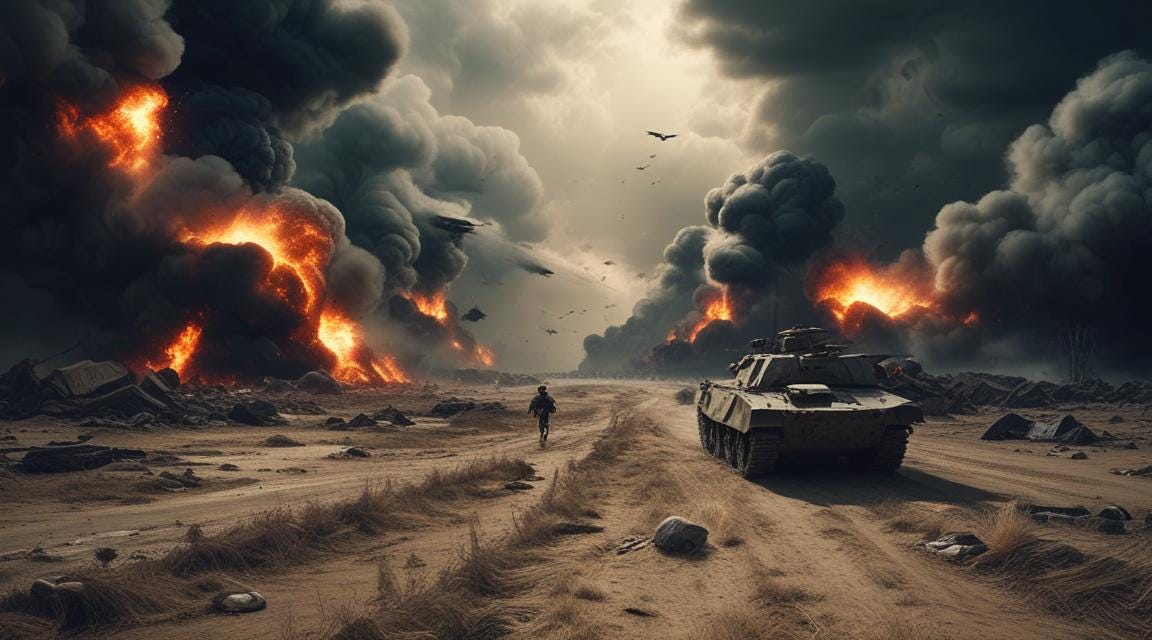Peace Pulverized: The Unthinkable Toll of World War III
The dream of a world united in peace can be shattered in an instant. A catastrophic World War Three, a chilling possibility that lingers on the periphery of global discourse where dialogue is missing.
WWIII wouldn't just be a clash of militaries; it would be a possible annihilation of the very fabric of peace-loving societies, with potential consequences for a generation, that may never see another, if such a war erupts, fueled by the very governments sworn to protect them.
WWIII - An Evil Scenario That Has Already Begun
The immediate impact would be a horrifying surge in casualties. Modern weaponry is designed for lethality, and civilian populations would be far from immune. Indiscriminate bombings, chemical attacks – the specter of a bygone era would become a horrifying reality. Even those fortunate enough to escape the direct violence wouldn't be spared. Infrastructure would crumble, leading to widespread shortages of food, water, and medicine. Healthcare systems, already strained in many parts of the world, would collapse entirely. Famine and disease would stalk the ravaged landscape, claiming countless lives.
Beyond the physical devastation, the war would inflict deep psychological wounds. Societies built on trust and cooperation would fracture. Fear and paranoia would become the norm. The concept of peace, once a cherished ideal, would be a distant memory, replaced by a constant struggle for survival.
Governments, the very institutions entrusted with safeguarding citizens, could become the source of their greatest peril. The descent into war might be fueled by misinformation, propaganda, and the manipulation of nationalistic fervor. Peace-loving individuals would be forced to choose between blind obedience and dissent, risking persecution or even death.
This war wouldn't be confined to battlefields. Cyberattacks would cripple communication networks, plunging societies into chaos. Education and dialog, cornerstones of peacebuilding, would grind to a halt. A generation raised amidst the horrors of war would inherit a world devoid of the knowledge and skills necessary to rebuild and work with one another in peace.
The environmental consequences would be catastrophic. Warfare would unleash a torrent of pollutants, poisoning air, water, and soil. Nuclear war, a possibility however unthinkable, could trigger a "nuclear winter," a period of global cooling that would devastate agriculture and possibly plunge the world into a new ice age.
The Potential End of Another Generation
The potential end of a generation is a stark but necessary consideration. The interconnectedness of the world today works to ensure that a major conflict wouldn't be a regional affair. The ripple effects would be global, leaving behind a world with a decimated population, a poisoned environment, shattered lives and their livelihoods.
This grim scenario isn't inevitable. It serves as a stark reminder of the importance of communication, so called diplomacy, de-escalation, and international cooperation. Peace-loving people have a crucial role to play: by advocating for dialogue, holding their leaders accountable, and fostering understanding across cultures.
By actively working for peace, societies can help to build a more peaceful world for this generation, and maybe also for future generations, if they inherit a world where dialogue trumps violence, and peaceful cooperation paves the way forward to coexistence.
The Glimmer of Hope: Seeds of Peace in the Ashes
The previous sections painted a bleak picture, but even in the darkest of times, humans can find ways to endure and rebuild. What are the potential glimmers of hope that might emerge from the ashes of another World War.
The Resilience of the Human Soul: History is replete with examples of societies overcoming immense hardship. The human capacity for adaptation and perseverance is remarkable. In the aftermath of war, communities would likely come together, drawing strength from shared experiences to rebuild their lives. Grassroots movements focused on survival, mutual aid, and rebuilding infrastructure would likely emerge.
The Strength of Technology: While technology can be a weapon of destruction, it can also be a tool for healing. Communication networks, after initial disruption, could be rebuilt, facilitating coordination of relief efforts and fostering a sense of global solidarity. Advances in medicine, even if limited, could prove crucial in treating the wounded and preventing outbreaks of disease.
The Disillusionment with War: The horrors of World War Three would likely lead to a profound disillusionment with war itself. The generation raised amidst this conflict would understand the true cost of violence, and this understanding could fuel a powerful anti-war movement. This could lead to a renewed global commitment to disarmament and a strengthening of international institutions for conflict resolution. But what have we learned so far after watching the horrors of the previous wars?
The Emergence of New Leadership: In the aftermath of war, new leadership could emerge, figures who reject the ideologies that led to the conflict and champion peace and cooperation. These leaders could forge alliances across former enemy lines, working towards a new world order based on mutual respect and understanding.
The Enduring Impact of Arts: Even amidst the devastation, expressions like art, music, and storytelling would likely continue. These creative outlets would provide a sense of solace and unity, reminding people of the human sacrifices and the impact of a peaceful world they are struggling to rebuild.
The Importance of Memory: Preserving the memory of the war would be crucial. Museums, and educational programs would ensure that future generations understand the devastating cost of conflict and work to prevent its recurrence.
The road to rebuilding after World War Three would be long and arduous. Yet, the enduring capacity of humans for hope and resilience suggests that a new dawn could eventually break. It is the responsibility of the peace-loving people of today to work tirelessly to prevent such a war, ensuring that the seeds of peace are sown even in the most fertile ground: the ashes of conflict.
Cultivating Peace: Actions for a World Without War Three
The possibility of World War Three casts a long shadow, but peace isn't a passive wish; it requires active engagement. Here are some ways peace-loving people can work to prevent this unthinkable scenario:
Hold Leaders Accountable: Peace doesn't happen in a vacuum. Citizens must hold their governments accountable for their actions. This means critically evaluating foreign policy decisions, demanding transparency, and raising your voice against war rhetoric. Educate yourself on international issues and hold peaceful protests or engage in constructive dialogues with elected officials.
Support Diplomacy and De-escalation: Diplomacy not hypocrisy is the cornerstone of peaceful conflict resolution. Advocate for peaceful solutions to international disputes. Support organizations working on true diplomacy and de-escalation efforts. Encourage cultural exchange programs that foster understanding between different nations.
Promote Peace Education: Education is key to breaking cycles of violence. Support educational initiatives that promote peacebuilding, conflict resolution, and intercultural understanding. Encourage critical thinking skills that allow individuals to see through propaganda and misinformation.
Empower Grassroots Movements: Peace can bloom from the ground up. Support and participate in grassroots peace movements working for disarmament, social justice, and human rights. These movements can amplify the voices of peace-loving people and pressure governments to prioritize diplomacy over violence.
Combat Misinformation: Disinformation and propaganda can fuel tensions and lead to war. Develop your media literacy skills to critically evaluate information. Support independent journalism and fact-checking organizations truly working to combat misinformation without any hidden agendas.
Engage In Cultural Exchange: Fear of the "other" often fuels conflict. Promote cultural exchange programs that foster understanding and empathy between different societies. Celebrate diversity and learn about different nations through art, music, and literature.
Build Bridges, Not Walls: Isolationism and suspicion breed mistrust. Support initiatives that encourage cooperation and collaboration between nations. Advocate for increased international trade and economic interdependence, which create incentives for peaceful solutions.
Challenge War Narratives: Question the glorification of war in popular culture. Advocate for stories that celebrate peace, cooperation, and diplomacy. Support artists and activists who promote a culture of peace.
Live Peacefully: Peace starts with the individual. Practice empathy and understanding in your daily interactions. Seek peaceful solutions to conflicts in your own life. Be a role model for peace in your community.
The road to peace is long, but every action, every voice raised, is a step away from the precipice of war. By working together, peace-loving people can create a world where dialogue trumps violence, and cooperation paves the way for a future where World War Three becomes a nightmarish relic of a bygone era. Remember, peace isn't just the absence of war; it's the active pursuit of justice, understanding, and cooperation. But can you build a world where peace is not just a dream, but a thriving reality?
Cultivating Peace: Actionable Steps to Prevent World Wars
The chilling possibility of World War Three hangs heavy in the air. But peace isn't a spectator sport; it demands active engagement. Here are a few more concrete actions peace-loving people can take to prevent this unthinkable scenario:
Hold Leaders Accountable – Get Loud:
Organize town halls: Facilitate discussions with elected officials about foreign policy decisions.
Contact your representatives: Write letters, emails, or make phone calls expressing your concerns about war rhetoric and advocating for diplomacy.
Support investigative journalism: Donate to organizations exposing government misconduct that could lead to war.
Organize peaceful protests: Raise public awareness about the dangers of war and the importance of peaceful solutions.
Support Diplomacy and De-escalation – Get Connected:
Volunteer with peace organizations: Offer your time and skills to groups working on conflict resolution and de-escalation efforts.
Donate to peacebuilding initiatives: Support organizations promoting cultural exchange programs and fostering understanding between nations.
Connect with international pen pals: Forge personal connections that break down stereotypes and build empathy.
Advocate for international treaties: Lobby your government to support treaties that limit weapons proliferation and promote peaceful conflict resolution.
Promote Peace Education – Get Equipped:
Volunteer with educational programs: Teach conflict resolution skills and the importance of peacebuilding in schools or community centers.
Organize movie screenings and discussions: Spark conversations about the human cost of war through film and open dialogue.
Develop online educational resources: Create websites or social media campaigns that educate people about the dangers of war and the benefits of peace.
Demand peace education in schools: Lobby your school board to include peacebuilding and conflict resolution curriculum.
Empower Grassroots Movements – Get Involved:
Join or start a local peace group: Organize events, raise awareness, and advocate for policies that promote peace.
Support anti-war campaigns: Donate to organizations mobilizing against specific conflicts or promoting disarmament.
Participate in non-violent demonstrations: Raise your voice for peace through peaceful protests and civil disobedience (within legal boundaries).
Amplify the voices of peace activists: Share their stories and messages on social media platforms.
Combat Misinformation – Get Informed:
Fact-check information before sharing: Verify information before sharing it online or with friends and family.
Support independent journalism: Subscribe to trusted and independent news sources that prioritize fact-based reporting.
Report misinformation online: Flag misleading or false information on social media platforms.
Develop media literacy skills: Learn how to critically evaluate information and identify bias in news sources.
These steps are merely a starting point on the road to a world etched in peace. Through collective action, peace-loving individuals can ignite significant change. A singular voice can spark a movement, encouraging others to take action. The challenge lies in unifying efforts to build a peaceful world where the horrors of World Wars serve as a stark reminder, never to be repeated. In its place, let peace become the unshakable cornerstone of our reality.













